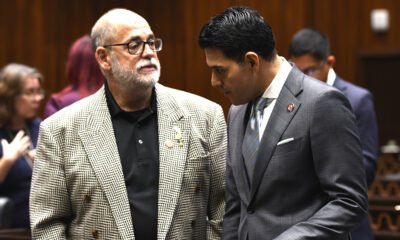Commentary
Arizona’s Ticket Split: Spotlight on Candidate Quality Dilemma

The GOP experienced a mix of successes and setbacks in Arizona during the lead-up to the 2024 Election. While the party celebrated several wins, the defeat of Kari Lake in her Senate bid to Ruben Gallego stood out as a significant loss. Had Donald Trump’s influence resonated more strongly, Lake might have had a better shot at the Senate seat.
Despite her previous position as a prominent figure in the MAGA movement, Lake’s campaign suffered from numerous mistakes. Her tone seemed misaligned with the political sentiments of moderates, which turned off some Republican voters. With muddled messaging and ineffective optics, her appeal diminished over time.
Lake’s candidacy sparked skepticism among voters regarding her consistency. Her steadfastness on immigration and border control was evident, yet her backtracking on abortion raised eyebrows. Initially describing abortion as the “ultimate sin,” she later shifted to opposing the enforcement of an 1864 ban, attempting to reshape her stance after backlash. Disregarding the potential consequences of these changes proved detrimental to her campaign.
Her fluctuating position on abortion created doubt among her conservative base. Pro-life advocates expressed concern over her mixed messages, with one pastor questioning, “Who do we count on?” Lake’s attempts to appease her base appeared disingenuous, leaving voters uncertain about her true stance.
In contrast, Ruben Gallego maintained a more moderate stance on border security. His ability to navigate to the center was notably more straightforward than Lake’s complex approach to abortion. This made him a compelling candidate, especially in a polarized political environment.
Further complicating her campaign, Lake’s insistence on promoting conspiracy theories regarding the 2022 election’s integrity alienated some voters. Fellow Trump supporters deemed her comments as “incessant whining,” underscoring her struggle to present a unifying message. According to political analysts, Lake lacked the charm that characterized Trump, who effectively used humor to connect with his audience.
Instead of comedic jabs at Gallego, Lake resorted to harsh remarks that seemed to backfire, further damaging her image. Her aggressive tactics may have resonated with a segment of the Republican base, but they failed to attract moderate voters in a state with a substantial independent population.
Gallego expertly capitalized on Lake’s shortcomings by appealing to anti-Trump Republicans, moderates, and Latino voters. He drew on his working-class roots and military background to garner respect from McCain Republicans, successfully positioning himself as a viable alternative amidst discontent with Lake’s divisive rhetoric.
In light of this electoral outcome, it is understandable that GOP leadership refrained from investing in Lake’s campaign. The repeated failures to learn from past mistakes demonstrated a disconnect from what Arizona voters desire. As evidenced in the 2024 Election, a focus on clear policy positions and an image that resonates with moderate interests could be pivotal for future Republican candidates in Arizona.
Peter Clark is an Arizona-based writer whose expertise spans several notable publications, including AzCentral and AZ Capitol Times.


















